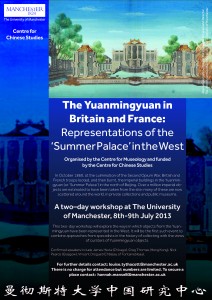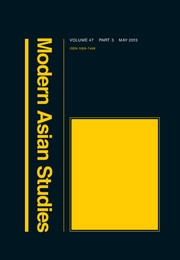 I was extremely fortunate to receive a BICC studentship for my MPhil and DPhil studies at the University of Oxford – this support enabled me to be in the position I am today, as a British Academy Postdoctoral Research Fellow, working on China and nuclear weapons issues. I’m proud to be part of the BICC network – many of the researchers have become close friends, and I have immense respect for the senior academics that have helmed the BICC. As part of this network, in 2011, I was able to participate in the China’s Futures seminar organised by Professor William Callahan, as well as the China: Innovation and Invention workshop, which I co-organised with Astrid Nordin. Both these collaborations resulted in publications: a China Information article on Chinese nuclear strategy, and together with Astrid Nordin and Professor Shaun Breslin, a co-edited volume titled Chinese Politics and International Relations: Innovation and Invention, coming out with Routledge this year.
I was extremely fortunate to receive a BICC studentship for my MPhil and DPhil studies at the University of Oxford – this support enabled me to be in the position I am today, as a British Academy Postdoctoral Research Fellow, working on China and nuclear weapons issues. I’m proud to be part of the BICC network – many of the researchers have become close friends, and I have immense respect for the senior academics that have helmed the BICC. As part of this network, in 2011, I was able to participate in the China’s Futures seminar organised by Professor William Callahan, as well as the China: Innovation and Invention workshop, which I co-organised with Astrid Nordin. Both these collaborations resulted in publications: a China Information article on Chinese nuclear strategy, and together with Astrid Nordin and Professor Shaun Breslin, a co-edited volume titled Chinese Politics and International Relations: Innovation and Invention, coming out with Routledge this year.
I started my studentship with no prior background on China or the language, so the BICC proved crucial in laying the intellectual groundwork and in introducing me to the scholarly community, allowing me to find my feet in the China field. Of course, the financial support mattered a great deal too. As a result of BICC funding, I was able to conduct extensive fieldwork abroad during my doctoral studies, notably as a visiting scholar at the Arms Control Program at Tsinghua University in Beijing for the 2010-11 academic year, and at the James Martin Center for Nonproliferation Studies in the US in spring 2009 and winter 2011. This fieldwork was essential since the nature of my doctoral research was somewhat sensitive: nuclear weapons. My DPhil, supervised by Professor Rosemary Foot, was defended with no revisions in March 2012. The thesis explored China’s role in global nuclear politics since 1949. One of my major findings was that Maoist China shaped global nuclear politics to a far greater degree than was previously understood. The thesis has since been turned into a manuscript and is currently under review for publication.
As a British Academy Postdoctoral Fellow based at Oxford, I continue my interest in China and nuclear issues. My three year research project examines what it means to be a responsible nuclear armed state, with a particular emphasis on China. Overall, the project is more conceptual and contemporary than my doctoral research. I also have a number of side projects on the go. I contribute to the 21st Century Concerts of Power project led by Professor Andrew Hurrell at Oxford, focusing on global governance related to nuclear weapons, as well as Chinese conceptions of great power cooperation. I am also co-writing, together with Kate Sullivan at Oxford, an article on Chinese and Indian approaches to nuclear restraint. In another project, with Amy King of Australia National University, I survey the use of new Chinese sources in the study of China in the International Relations field.
My research also has an impact outside academia. In 2011, I designed and taught a graduate course on Chinese nuclear weapons policy at the James Martin Center for Nonproliferation Studies for students seeking government careers and visiting diplomats working in nuclear-related policy areas. More recently, in January and March 2013, I took part in the FCO sponsored UK-China nuclear dialogue organised by King’s College London and Renmin University. Finally, this summer, I have been invited to attend the EU Consortium on Nonproliferation in Brussels as well as the ‘Towards global nuclear order: deterrence, assurance and reductions’ conference at Wilton Park in the UK.
I wouldn’t have been able to do any of the above without the sustained support I received from the BICC for five years. Support that has been not just financial, but also academic and social, rooting me in the China and International Relations academic fields as well as policy communities in the UK, EU, US and China.





